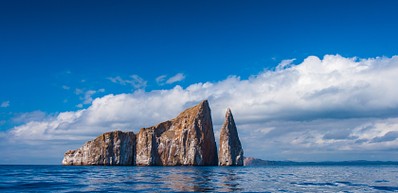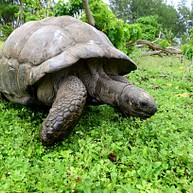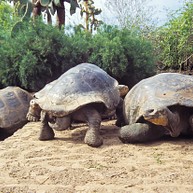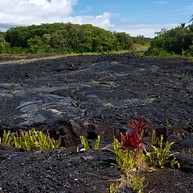
-
![]() Provided by: Paul van den Berg/Shutterstock.com
Provided by: Paul van den Berg/Shutterstock.com

Our travel guides are free to read and explore online. If you want to get your own copy, the full travel guide for this destination is available to you offline* to bring along anywhere or print for your trip.
*this will be downloaded as a PDF.Price
€4,95
Charles Darwin Research Center
The guide was updated:The over 100 scientists, educators, researchers and volunteers who work at the Charles Darwin Research Center carry out extensive scientific research and oversee the conservation and safeguarding of the islands' natural resources and wildlife. Visitors are welcome to visit and learn about how they are continuing the scientific inquiries started by Darwin himself, and how their efforts are helping to preserve the wonders of the Galapagos.
Useful Information
- Address: Puerto Ayora, Santa Cruz, Galapagos
- Website: www.darwinfoundation.org/en
- Phone: +593 5 252 6146
- Email: cdrs@fcdarwin.org.ec
Digital Travel Guide Download
Our travel guides are free to read and explore online. If you want to get your own copy, the full travel guide for this destination is available to you offline* to bring along anywhere or print for your trip.
*this will be downloaded as a PDF.Price
€4,95

Roca León Dormido or Kicker Rock is located close to Isla de San Cristobal. Some see a sleeping sea lion, some a shoe when looking at the 500 ft high granite towers. A ship will bring you close to Kicker Rock – enjoy snorkelling around it, possibly alongside hammerhead sharks, rays and turtles.
Read more

Rancho Primicias
Dozens of giant tortoises roam the premises of Rancho Primicias on the island of Santa Cruz, and visitors are welcome to explore and get up close and personal with them. These tame giants can weigh over 400 kg, grow to be 1.8 metres long, and live to be well over 100 years old.
Read more

Charles Darwin Research Center
The over 100 scientists, educators, researchers and volunteers who work at the Charles Darwin Research Center carry out extensive scientific research and oversee the conservation and safeguarding of the islands' natural resources and wildlife. Visitors are welcome to visit and learn about how they are continuing the scientific inquiries started by Darwin himself, and how their efforts are helping to preserve the wonders of the Galapagos.
Read more

Scuba Diving
For a closer look at the abundant and fascinating marine life, suit up and peek under the waves. Share the waters with fur seals, tuna, manta rays and the world's only marine iguanas, and marvel at the coral beds that decorate the ocean floor.
Read more

Lava Tubes
A network of eerily beautiful underground tunnels extends for several kilometres near the village of Santa Rosa. They formed when the outer layer of a lava flow solidified, allowing the interior to continue flowing, leaving the hollow lava tunnels for travelers to explore freely. They are vast and have electric lighting, making them easy to explore independently, or with the help of hired guides.
Read more

Tortuga Bay
Getting to Tortuga Bay involves a hike of about one hour, but the effort is greatly rewarded by a pristine shoreline and spectacular white sand beach. You can try some surfing in the gentle breaks, snorkel in the lagoons to admire colourful reef fish, white-tip sharks, rays and sea turtles, or simply relax on the sand alongside marine iguanas and sally lightfoot crabs.
Read more

La Lobería
A favourite place to meet and admire wildlife, this stretch of beach is home to (and named after) the large numbers of seals that can always be found frolicking or relaxing on the sand or among the waves nearby. Seal pups are a common sight here, but be sure to stay clear of the larger male seals, which can be aggressive towards humans if they feel at all threatened.
Read more

Las Grietas
Adventure seekers can get their adrenaline pumping at this crystalline swimming hole by jumping from the newly-built platform on the surrounding cliffs. Las Grietas is a series of crevices that formed during the cooling process of the lava that formed these islands. The hike to get there takes travelers through a forest of huge cacti and over jagged and sometimes tricky lava rock formations, but the azure waters make the trip well worth the effort.
Read more

Sierra Negra
Strong hikers can attempt to scale the Sierra Negra volcano, which boasts the world's second largest volcanic caldera. The hike can take visitors to the rim of the imposing 6-mile wide crater and over alien volcanic fields and landscapes, giving them the opportunity to admire strange and interesting geological features and to enjoy the views of volcanoes on other islands from a distance. Visiting the volcano can mean a total of 6 hours hiking, though, so make sure you are prepared for such an adventure.
Read more
Do & See
Las Tintoreras
Las Tintoreras is a set of islets named after the reef sharks that frequent them. It has completely calm turquoise waters where wildlife abounds, and it is common to view sea lions, reef sharks, sea turtles, marine iguanas, and more. The clear and beautiful waters make it a favourite place for snorkeling.
Read more

Puerto Egas
This long, black lava shoreline is home to huge amounts of wildlife which spends its days basking in the sun on the flat expanses of lava fields or among the surrounding caves and formations. Marine iguanas, Sally Lightfoot crabs, Darwin's finches, sea lions, and lava lizards can be seen against the black backdrop of the shoreline.
Read more


